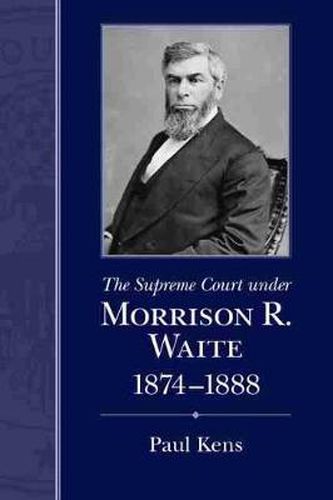Readings Newsletter
Become a Readings Member to make your shopping experience even easier.
Sign in or sign up for free!
You’re not far away from qualifying for FREE standard shipping within Australia
You’ve qualified for FREE standard shipping within Australia
The cart is loading…






In The Supreme Court under Morrison R. Waite, 1874-1888, Paul Kens provides a history of the Court during a time that began in the shadow of the Civil War and ended with America on the verge of establishing itself as an industrial world power. Morrison R. Waite (1816-1888) led the Court through a period that experienced great racial violence and sectional strife. At the same time, a commercial revolution produced powerful new corporate businesses and, in turn, dissatisfaction among agrarian and labor interests. The nation was also consolidating the territory west of the Mississippi River, an expansion often marred with bloodshed and turmoil. It was an era that strained America’s thinking about the purpose, nature, and structure of government and ultimately about the meaning of the constitution. Challenging the conventional portrayal of the Waite Court as being merely transitional, Kens observes that the majority of these justices viewed themselves as guardians of tradition. Even while facing legal disputes that grew from the drastic changes in post-Civil War America’s social, political, and economic order, the Waite Court tended to look backward for its cues. Its rulings on issues of liberty and equality, federalism and the powers of government, and popular sovereignty and the rights of the community were driven by constitutional traditions established prior to the Civil War. This is an important distinction because the conventional portrayal of this Court as transitional leaves the impression that later changes in legal doctrine were virtually inevitable, especially with respect to the subjects of civil rights and economic regulation. By demonstrating that there was nothing inevitable about the way constitutional doctrine has evolved, Kens provides an original and insightful interpretation that enhances our understanding of American constitutional traditions as well as the development of constitutional doctrine in the late nineteenth century.
$9.00 standard shipping within Australia
FREE standard shipping within Australia for orders over $100.00
Express & International shipping calculated at checkout
In The Supreme Court under Morrison R. Waite, 1874-1888, Paul Kens provides a history of the Court during a time that began in the shadow of the Civil War and ended with America on the verge of establishing itself as an industrial world power. Morrison R. Waite (1816-1888) led the Court through a period that experienced great racial violence and sectional strife. At the same time, a commercial revolution produced powerful new corporate businesses and, in turn, dissatisfaction among agrarian and labor interests. The nation was also consolidating the territory west of the Mississippi River, an expansion often marred with bloodshed and turmoil. It was an era that strained America’s thinking about the purpose, nature, and structure of government and ultimately about the meaning of the constitution. Challenging the conventional portrayal of the Waite Court as being merely transitional, Kens observes that the majority of these justices viewed themselves as guardians of tradition. Even while facing legal disputes that grew from the drastic changes in post-Civil War America’s social, political, and economic order, the Waite Court tended to look backward for its cues. Its rulings on issues of liberty and equality, federalism and the powers of government, and popular sovereignty and the rights of the community were driven by constitutional traditions established prior to the Civil War. This is an important distinction because the conventional portrayal of this Court as transitional leaves the impression that later changes in legal doctrine were virtually inevitable, especially with respect to the subjects of civil rights and economic regulation. By demonstrating that there was nothing inevitable about the way constitutional doctrine has evolved, Kens provides an original and insightful interpretation that enhances our understanding of American constitutional traditions as well as the development of constitutional doctrine in the late nineteenth century.